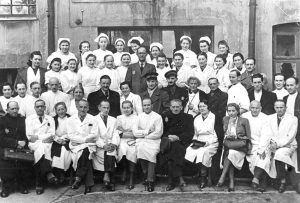Medical Program
FASPE was a phenomenal experience. I came in hoping to learn how to better approach ethics in the medical profession, and I left with a better understanding of how our profession, a profession of healing, can transform itself to participate in such destruction.
Jessi Gold
2013 FASPE Medical Fellow
FASPE is an intensive, two-week study program in professional ethics and ethical leadership. FASPE is neither a Holocaust studies course, nor a genocide prevention program. Rather, the curriculum is designed to challenge Fellows to critically examine constructs, current developments and issues that raise ethical concerns in their professions in contemporary settings in which they work.
FASPE Medical Fellows examine the motivations and conduct of German physicians in enabling and executing Nazi policies. FASPE then draws on these historical examples to help Medical Fellows grasp their role and responsibility as individuals with influence in their communities; and to encourage them to identify and confront the ethical issues currently facing physicians and the medical profession at large.
Each year, FASPE Medical awards fellowships to 13 to 16 medical students and residents. Fellows spend two weeks in Berlin and Poland, where they visit key sites of Nazi history and participate in daily seminars led by specialized faculty. The program couples the power of place with academic rigor and many informal opportunities for creative exchange.
FASPE draws on a large pool of applicants, whose diverse backgrounds and interests enrich discussions both inside and outside the seminar room. Medical Fellows travel with Seminary and Journalism Fellows, allowing them to broaden their understanding of the role of professionals over shared meals and activities and in several interdisciplinary seminars. FASPE Fellowships are fully funded so that financial ability does not affect participation.
Eligibility
FASPE Medical applicants must fit into one of following categories: 1) be enrolled in an MD or DO program (or equivalent) at the time of their application and anticipate completion of at least one clinical year prior to the start of the fellowship; OR 2) be enrolled in a residency program.
FASPE seeks Fellows who are interested in engaging in discussions with their co-Fellows and faculty, and who have the intellectual and emotional maturity to unpack difficult and controversial issues responsibly and respectfully in small group settings. FASPE values and seeks to create inclusive environments, and welcomes applicants of all religious, political, and socioeconomic backgrounds as well as gender identities. Moreover, FASPE seeks Medical Fellows with diverse interests and backgrounds, including those pursuing careers practicing medicine, in research, or in public health. Fellows are selected on the basis of their academic background, personal and professional experiences, capacity for leadership and ability to contribute to the program and the alumni community. All applications are welcome and reviewed.
DATES FOR THE 2024 MEDICAL PROGRAM: June 20, 2025 - July 4, 2025
We will begin accepting applications for the 2025 Fellowships on August 30, 2024.
To learn more about the 2025 program, please fill out a brief form here.
To view photos of the 2023 Medical program and to read about the experience, please go here.
FASPE Medical Fellows examine topics such as:
- the complicity of medical professionals in the design and execution of Nazi policies
- the allocation of medical care in a time of limited resources
- the role and limits of contemporary bioethics, including with regards to physician-assisted death and technological advancements
- complicated issues in research ethics, including when research is conducted outside of the United States and the impact of technological advancements
- the legacy of prejudice in the medical profession
- navigating multiple loyalties to individual patients, the larger patient population, the public good, research goals, medical institutions and more
- end-of-life care (structured as an interdisciplinary discussion with Seminary Fellows)
- tactics for addressing ethical issues within medicine’s institutions
 Doctors and staff of the Lodz Ghetto hospital, Lodz, Poland, 1940-1944.Gift of Esther Fox, Yaffa Eliach Collection donated by the Center for Holocaust Studies, Museum of Jewish Heritage, NY
Doctors and staff of the Lodz Ghetto hospital, Lodz, Poland, 1940-1944.Gift of Esther Fox, Yaffa Eliach Collection donated by the Center for Holocaust Studies, Museum of Jewish Heritage, NYFASPE Medical Fellows are now in diverse residency or other post-graduate programs or are working as practicing physicians, researchers at major universities, bioethicists and public health professionals. Through their shared FASPE experience, Fellows form long- lasting relationships and deep bonds that grow over time. Medical Fellows participate in formal and informal networks that provide support throughout their careers.
FASPE Medical was initially developed in consultation with faculty at the Yale School of Medicine.

